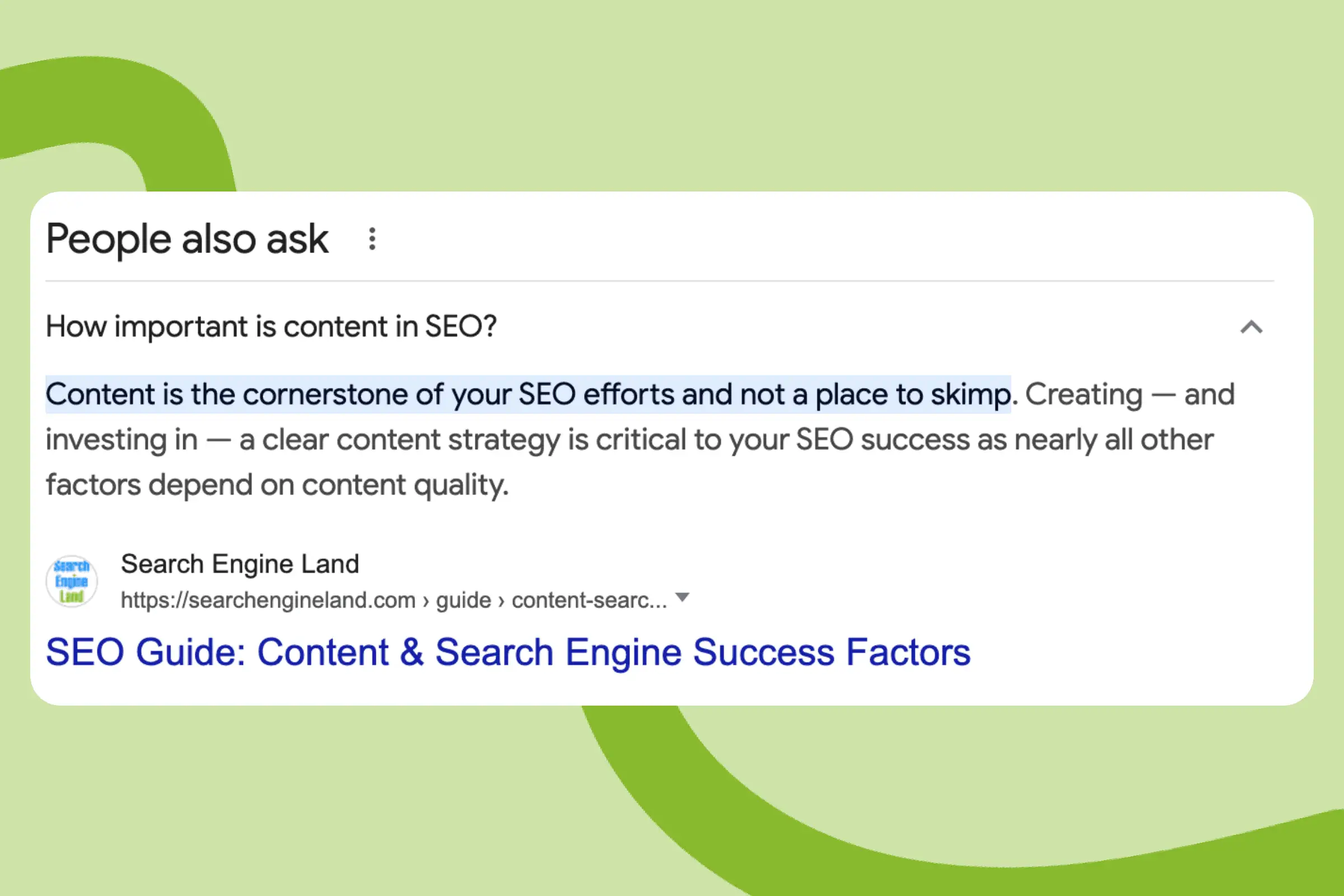For a long time now, SEO and content have gone hand in hand. But we’re often asked, “Do they have to? Do I need to write content to win the SEO race?”
And we’re not going to bury the lead here — the answer is, “Yes.”
Succeeding with SEO, especially in 2024, is all about becoming an authority in your space. It's about being the person, business, or online resource that holds the answers — answers that Google trusts to be correct. And to do that, you need content.
We’re going to take you through the relationship between content and SEO, why it matters, what you need to know, and give you some tips to make your content the kind your SEO needs to thrive.
Table of Contents
ToggleThe TL;DR (too long, didn't read) 👇
Yes, you do need content to rank on Google.
- Content includes keywords, but it demonstrates your understanding of your industry, positioning you as a leader in your space.
- Content marketing and SEO writing are growing in the same direction.
- SEO writing is more than just optimisations now. It's demonstrating your experience and authority.
- Write natural, easy to read content, and cover topics in full.
- And hey, promoting your content is always a bonus.

What do we mean by content?
Nowadays, content refers to so many different aspects of marketing. It’s Instagram captions, it’s TikTok videos, it’s visual collateral for your website, it’s even podcasts.
In this article, when we talk about content for SEO, we’re talking about digital written content — the kind that lives on your website’s blog.
(Important to clarify because there are other kinds of SEO content, but that’s a whole other blog post that we’ll save for another time.)
Let's cut to the chase: SEO & content belong together 🤝
Especially in the last three years or so, Google’s big focus has been on content.
Not just content, but quality content that engages, educates, and brings new perspectives to ideas and topics.
Google searches are largely driven by a need for information, and it’s high-quality content that is able to answer those searches.
The two go hand-in-hand.
Here’s why 👇

How content boosts SEO rankings 🪜
In the world of SEO, content is best known as a vessel to hold the keywords you want to rank for. And sure, that’s not wrong.
But it’s not entirely right, either. Content is how you can demonstrate to Google that you’re the authority on a topic. It’s more than just hitting keywords. It’s answering questions that people are actually searching for. It’s bringing new perspectives, opinions, and your first-hand experience to the table.
By covering topics in full and demonstrating your experience within the topic, you can provide value, engage readers, and tick off more boxes than just hitting a keyword count.

Is there a difference between content marketing and SEO content writing? 📣
Content marketing and SEO content writing share a lot of similarities while being worlds apart. Although, those worlds are coming closer together.
What do we mean by that? Well…
Traditionally, SEO content was about creating a piece of content that hit the right word count, with the right density of a few keywords, and some internal links scattered in for good measure.
Content marketing, on the other hand, has long been about catering to your target market’s needs when it comes to information, creating engaging content, and offering value to your readers. In fact, when it first rose in popularity, it was dubbed a pretty passive form of marketing — because the idea was to position yourself as a friendly brand that’s there to offer value without the aggressive marketing tactics.
Now, though, Google wants us to steer away from that original approach and more towards that engaging, informative, value-based approach.
What they now have in common is a focus on the end user 🙋♀️
The two now come together in their focus on the end user. It’s about answering real questions, in a way that’s succinct and easy to understand, and provides enough context for the user to understand the topic in full.

It's much more than keyword research & optimising a blog post 🏆
Search engines, algorithms & EEAT 🍜
Search engines and their algorithms (how they understand and rank content) are changing.
Google, in particular, is now focused on EEAT. It stands for Experience, Expertise, Authority, and Trustworthiness. And that’s what it wants demonstrated in the content we write for SEO.
EEAT is basically how Google assesses the quality of the content we write.
So, we want to demonstrate Expertise — this can be as simple as introducing yourself as the author and including your specific expertise.
For Experience, this is about referring to your experience specifically. Ie. “When we write content for SEO, we’re trying to hit these specific targets.”
Authority is one that comes externally — this is through backlinks to your blog post or by building topical authority — we’ll get to that in the next section, though 👇
And Trustworthiness? Well that’s just about being honest, citing your research, and creating a trustworthy website generally.
Topical authority over keyword optimisation
It's about meeting needs, not algorithm guidelines
Well… appeasing the algorithm is still a good idea.
But what we mean by this is…
If your content:
- Answers the question in full
- Offers a wealth of information
- & is easy to understand
Then that’s going to perform a lot better than an article that doesn’t go into any real substance but hits a 2% keyword density.

Here's what you should keep in mind when writing content for search engine optimisation ✏️
So, how do you take the whole point of this article and apply it to your SEO content?
Here are some tips 👇
Make it relevant 🗞
You know when you look up a recipe on Google. But then you load it up and it starts with a 900-word story about how the author’s family has a rich history in the world of sourdough and you have to scroll and scroll to find the actual recipe?
That’s the best example of waffling on to reach a word count and your website visitor having a bad user experience as a result.
Keep the information relevant and if the fluff is super important to include, consider placing it closer to the bottom of the article.
Keep your keywords in mind, but don't overdo it ✅
You don’t need to hit a 2% keyword density or include long-tail keywords like ‘what makes a vegetable organic’ verbatim in your content.
Just write with your keywords in mind and include a healthy mix of them in a way that’s natural and easy to read.
Engage readers
Make your content fun or engaging, make sure it’s easy to read, and create a structure that the user can follow easily.
Think about how they’ll read the content and be thoughtful in giving them ways to get the gist of your article without having to sift through a thousand or so words.
Original content is useful and Google appreciates it 🧬
It’s pretty unlikely that you’re the only business in your industry creating content for your blog. So, chances are, the topics you’re qualified to write about have been covered.
That doesn’t mean you can’t create original content, though. Take a look at what’s around and work out a unique take on it, go more in-depth into a key element, or add your own specialist expertise into the content.
Google wants to see original content, not just rewrites of blog posts that already exist.
Use imagery, videos & graphics to paint the full picture 🎨
You don’t have to rely solely on your words to get demonstrate your expertise. Incorporate diagrams and graphics, break the content up with engaging imagery, or even include videos to break down the information in an easy-to-digest way.
Using other multimedia is a great way to offer a better experience in your content.
Write so Google's bots (and humans) understand you 🤖
When it comes to SEO and content, flowery language and long sentences aren’t going to cut it. It’s all about communicating information in a way that’s easy to understand. So, prioritise easy-to-read content.
Break your content down using headings, dot points, and smaller easy-to-read chunks. Skimmable content is a big winner in Google’s eyes.

Promoting your content can give it a boost in engagement 🚀
Even if you did only create your content with the goal of boosting your rankings and building a solid foundation for your SEO, you can benefit from promoting your content online.
Post it on your socials and share actionable tips or key takeaways from the articles. By encouraging your social media followers to go and look at the blog, you can boost traffic and make your SEO content perform even better.
Need a hand with your SEO and content creation? We'd love to help 👋
Book a chat with our team to find out how we can help you make the most of your content to start climbing the Google rankings.




